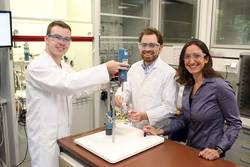UniCat graduate Mehtap Özaslan is establishing a junior research group at the University of Oldenburg
November 20, 2016
Prof. Dr. Mehtap Özaslan, a former UniCat Ph.D. student in Prof. Peter Strasser’s group, and junior professor of electrocatalysis at the University of Oldenburg, has just been awarded financing from the Federal Ministry of Research to investigate catalysts for fuel cells.
 |
Fuel cells are seen as a key technology for future energy systems. But achieving a breakthrough is taking time – it’s too expensive, too immature, and too unreliable, say the critics. Dr. Mehtap Özaslan wants to provide new approaches for her new junior research group. The Federal Ministry of Education and Research (BMBF) is supporting the project, "Efficient and robust electrocatalysts for the low-temperature polymer electrolyte membrane fuel cell," with financing of roughly two million Euros.
Platinum is the focus of Özaslan's research: large quantities of this precious metal are still needed for the fuel cell electrodes, where the chemical transformation into electrical energy takes place. Without platinum acting as catalyst, the necessary fuel cell activities cannot currently be achieved. "Sustainable handling of expensive materials such as platinum is necessary to enable an economical use of fuel cells in the long term," explains Özaslan.
Since the catalysis takes place only on the surface of the platinum, the amount of platinum used can be reduced by adding less noble metals such as cobalt and / or nickel - whereby the fuel cell becomes cheaper. By using these so-called alloy nanoparticles, the researchers are also improving the performance of the electrodes: "This drastically reduces the amount of platinum used, but achieves the same level of performance characteristics as with pure platinum, or even higher, " explains Özaslan.
In addition to platinum, the group is also investigating the carrier material: "We are looking at the catalyst as a whole for both half-cells in the fuel cell - that is what distinguishes our group from many others," says the chemist. Carbon is potentially a suitable carrier material. It is very conductive and affordable, but corrodes rapidly under the operating conditions of a fuel cell. Consequently, the efficiency and lifetime of the catalysts are reduced. Özaslan’s junior research group wants to change the carbon in a way to render it more stable. This is achieved by incorporating, for example, foreign atoms such as nitrogen into the carbon skeleton. "The key lies in the interaction between the particles and the carbon," says Özaslan.
Next, the scientists will examine both of the half-cell reactions of the fuel cell separately. Following that, the five-person team will switch from using the laboratory-scale cell to the real fuel cell. A correspondingly large test station, which Özaslan expects to be completed by April 2017, is part of the two-million-euro project.
Dr. Mehtap Özaslan became a Junior Professor of Electrocatalysis at the University of Oldenburg in 2014. Prior to that, she was a research assistant at the "Electrochemical Laboratory" at the renowned Paul Scherrer Institute in Villigen (Switzerland).
Dr. Özaslan studied chemistry at the Berlin University of Technology. She conducted her research within the Cluster of Excellence, UniCat. Her doctoral thesis on "Electrochemical Oxygen Reduction on Nuclear Shell Nanoparticle Catalysts for Fuel Cells" was awarded the European Umicore Scientific Award, endowed with 10,000 euros.
In 2007, she already received the Clara-von-Simson Award for the best diploma thesis by a female student in the field of natural sciences or engineering. As a postdoctoral student, Özaslan held a scholarship from the Robert-Bosch-Stiftung’s Fast Track program - a career program for excellent young scientists.
Contact
Prof. Dr. Mehtap Özaslan, University of Oldenburg, Institute of Chemistry,
Tel.: 0441/798-3917, E-Mail: mehtap.oezaslan(at)uni-oldenburg.de
